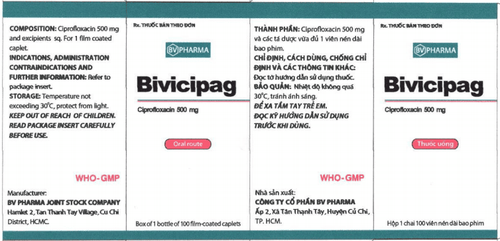This is an automatically translated article.
Azieurolife is a drug used to indicate the treatment of lower respiratory tract infections such as pneumonia, bronchitis or upper respiratory tract infections such as sinusitis, pharyngitis, tonsillitis,... Use of the drug Azieurolife through the article below.
1. What is Azieurolife?
Azieurolife is a pharmaceutical product manufactured by Eurolife Healthcare Pvt., Ltd - India and registered by Ozia Pharm Pty., Ltd. The drug belongs to the group of drugs used to treat parasites, infections, viruses and fungi with the main active ingredient being Azithromycin dihydrate 250mg. The drug is indicated for the treatment of upper respiratory tract infections, lower respiratory tract infections, skin and soft tissue infections, sexually transmitted diseases.
Azieurolife is made in capsule form, packed in a box of 1 blister x 10 tablets, each containing 250mg azithromycin and other excipients just enough.
2. Uses of the drug Azieurolife
2.1. The effect of drug components The active ingredient azithromycin in the drug is a semi-synthetic antibiotic of the azalide type, a subgroup of macrolides. The drug has a strong bactericidal effect by binding to the ribosomes of pathogenic bacteria, preventing their protein synthesis. Azithromycin has good effects on gram-positive bacteria such as Streptococcus, Pneumococcus, Staphylococcus aureus and gram-negative bacteria such as Haemophilus influenzae, Parainfluenzae, E. coli, Moraxella catarrrhalis, Acinetobacter, Neisseria gonorrhoeae,...
In addition, This antibiotic is also effective against Listeria monocytogenes, Chlamydia trachomatis, Chlamydia pneumoniae.
In general, azithromycin is slightly less active against gram-positive bacteria than erythromycin, but it is stronger against some gram-negative bacteria, including haemophilus.
2.2. Indications to use Azieurolife Drug Azieurolife is indicated for one of the following infections:
Lower respiratory tract infections: acute bronchitis and pneumonia,... Upper respiratory tract infections: pharyngitis, inflammation sinus, tonsillitis, otitis media, pharyngitis. Skin and soft tissue infections. Genital tract disease caused by Chlamydia trachomatis or Neisseria gonorrhoeae. 2.3. Contraindications Azieurolife is contraindicated in cases of hypersensitivity to azithromycin or other ingredients in the formulation. In addition, the drug is also contraindicated for the macrolide group.
3. Usage, dosage
In order for Azieurolife to be effective, patients need to use the drug correctly and in the correct dose according to the prescription prescribed by a qualified doctor.3.1. Administration The drug is taken orally directly with boiled or purified water before meals about 1 hour or 2 hours after meals.
Patients should swallow the tablet whole, do not chew or break, crush, or disperse the drug to avoid affecting the composition and effectiveness of the drug.
Note that do not take the drug with alcohol, beer, soft drinks, tea or carbonated, alcoholic beverages, ... will affect the effectiveness of the drug.
3.2. Dosage Children: Orally 10mg/kg for the first day and then 5mg/kg/day from day 2 to day 5 or 10mg/kg/day for 3 days. Adults: Take 500mg for the first day and the next 4 days at a dose of 250mg/day. This is a reference dose, the specific dose will be prescribed by the doctor based on the progress of the disease and the specific condition of each patient. Therefore, in order to have the best and most suitable dose to help the treatment process quickly, patients need to consult and take the drug as prescribed by the doctor. Absolutely do not arbitrarily buy medicine to use or adjust the dose without consulting the doctor.
4. Side effects
Azithromycin is well tolerated and has few side effects or side effects are usually mild, transient, and pass quickly. The most common side effects of the drug occur in the digestive system including: Nausea, vomiting, abdominal pain, flatulence, diarrhea, abdominal cramps.
When experiencing side effects or other unusual signs after taking the drug, the patient should immediately notify the doctor for advice on how to handle it safely.
5. Drug interactions
Azieurolife can interact with a number of other drugs and whether the interaction is synergistic or antagonistic, it can affect the effectiveness of existing drugs or cause additional side effects.
Therefore, in order to avoid drug interactions, the patient should inform the doctor about all drugs and functional foods and herbs being used for advice, adjustment, dosage change, prescription suitable and safe.
Some of Azieurolife's drug interactions include:
Antacids will reduce the absorption of azithromycin, so when 2 drugs are needed, azithromycin should be taken 1 hour before or 2 hours after taking the antacid. Because of possible interactions between azithromycin and cyclosporin, cyclosporin levels should be checked and dose adjusted if the two drugs need to be administered at the same time. Some macrolide antibiotics will decrease the biotransformation of digoxin. Therefore, digoxin levels should be checked when co-administered with macrolides, including azithromycin. As with other macrolide antibiotics, azithromycin should not be used concomitantly with ergot derivatives.
6. Notes and cautions
When using the drug Azieurolife, patients also need to note and be cautious of some of the following issues:
Use the drug exactly as prescribed and prescribed by the doctor, absolutely do not arbitrarily use the drug, do not change it yourself. change or adjust the dosage of the drug without consulting a qualified doctor. Care should be taken when administering azithromycin with broad-spectrum antibiotics because of the risk of superinfection with non-susceptible organisms and pseudomembranous colitis. Because of the potential for ergotin toxicity, concomitant use of azithromycin with ergot derivatives is not recommended. For patients with mild renal impairment (creatinine clearance > 40 ml/min), no dose adjustment is required. But patients with severe renal impairment should be careful when using azithromycin, need to be prescribed and consulted by a doctor. Because the hepatobiliary system is the major route of elimination of azithromycin, it should not be used in patients with hepatic impairment. The safety and effectiveness of azithromycin have not been established in pregnancy or lactation. Therefore, the drug should not be used during pregnancy, while breastfeeding, except in cases where it is absolutely necessary to be advised and prescribed by a doctor.
7. Missed dose, overdose
Missed dose: If you forget to take a dose, you can take it as soon as you remember, but if it is almost time for your next dose, skip the missed dose. Do not combine 2 doses of the drug at the same time to avoid increasing side effects or overdose.
Overdose: When there are signs of suspected overdose or danger signs, it is necessary to stop the drug and call the doctor immediately for advice or directly take the patient to a medical center for emergency and treatment. timely.
8. How to store medicine
The medicine should be stored in a cool and dry place, away from moisture and direct sunlight, with a temperature of 15 - 30 degrees Celsius. Keep the medicine in a place where children can't see and reach. and should be kept away from pets. For drugs that have expired or are no longer in use, they should not be thrown into the toilet or flushed under the tap. Collect and dispose of medical waste according to the instructions of your doctor, pharmacist or manufacturer or waste disposal company. The information on the uses, instructions for use and notes when using Azieurolife in this article is for reference only. The information is not intended for medical diagnosis or treatment. Therefore, in order to use the drug to achieve the best and safest treatment effect, users should consult and use the drug as prescribed by a qualified doctor.













